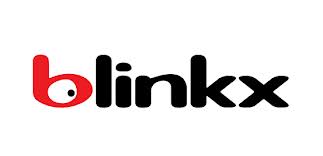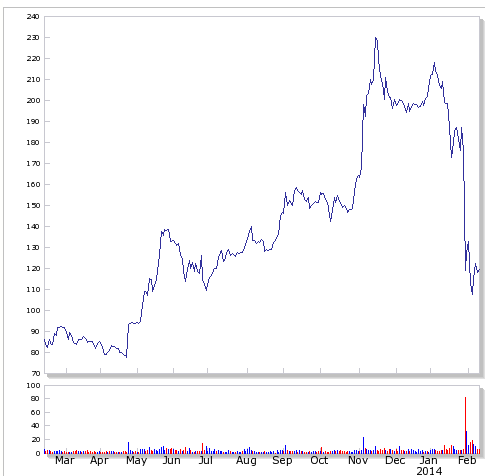Goldman Sachs tops up stake in Blinkx after Harvard Professor Ben Edelman casts doubt on company
Feb 12, 2014 at 6:42 am in General Trading by contrarianuk
At the end of January Harvard Professor Ben Edelman caused a storm when he published a blog post on internet video company Blinkx called “The Darker Side of Blinkx” which caused the internet video company’s shares to go into free fall. The price dropped 40% as a result of accusations that revenue was being flattered by the use of adware programmes. Blinkx vehemently denied Edelman’s accusations of any wrongdoing and has contacted the Financial Conduct Authority (FCA) with concerns that it has been the victim of market manipulation given that Edelman was being paid by financial institutions who were financially interested in the company.
Blinkx is an Internet Media platform founded in 2004 that connects online video viewers with content publishers and distributors, utilising advertising to monetise those interactions. The company was originally spun out of Autonomy, the notorius company founded by Dr. Mike Lynch and subsequently acquired by Autonomy with much controversy. It has an index of over 35 million hours of video and 800 media partnerships and floated on AIM in May, 2007.
Edelman’s article has increasingly come under scrutiny after it became clear that the research behind his blog post was paid for by investors who were short in the shares after he admitted a “portion” of the article had been prepared for an anonymous client. Two investors had built up a short position accounting for around 15% of the company. Investment companies shorting the stock include Luxor Capital Group, Jericho Capital Asset Management, Valiant Capital Management and Oxford Asset Management, according to regulatory filings. Carston Block, an infamous shorter of Chinese companies including SinoForest the collapsed Chinese Timber company, admitted he had made money from the fall in Blinkx’s share price, though after the blog post was published and he had not paid Edelman directly.
In his blog, Edelman said he was “struck by Blinkx’s apparent outsized success”. He said Blinkx was producing almost twice as much revenue per employee as its competitors and “looking at Blinkx’s sites and services, one doesn’t get the sense that Blinkx’s service is twice as good, or its employees twice as productive, as the other companies listed”, “Reviewing Blinkx’s statements to investors, I was struck by the opacity. How exactly does Blinkx make money?”, “I submit that Blinkx is carefully withholding this information because the company has much to hide. If I traded in the companies I write about (I don’t!), I’d be short Blinkx.”
Edelman has defended his actions saying He said: “The posting is my own work, written and posted for my own reasons. I’m grateful that investors were willing to pay for some of my time collecting a portion of the evidence that I ultimately chose to share with the public. But I wasn’t obliged to share the evidence with the public; it was my right, but not my duty, to do so if I so chose.”
Edelman has a history of producing controversial research not to the liking of some of his corporate targets. In 2011 Google claimed his report “Measuring Bias in Organic Web Search” which proposed that that the company promoted its own businesses ahead of competitors was fundamentally flawed because he was a paid consultant to Microsoft. Edelman denied that this had any influence on his report saying that he said he was a consultant for Google.
Yesterday, early investor Goldman Sachs announced it had increased its stake to 11.6% by acquiring another 5 million shares. Whether Blinkx is a fraud is the subject of intense debate, particularly its use of adware to boost views of its internet content. However for shareholders holding on after the accusations, Goldman’s top up appears to be a vote of confidence in the company. Interesting times for Blinkx!
Contrarian Investor UK
IMPORTANT: The posts I make are in no way meant as investment suggestions or recommendations to any visitors to the site. They are simply my views, personal reflections and analysis on the markets. Anyone who wishes to spread bet or buy stocks should rely on their own due diligence and common sense before placing any spread trade.
Edelman’s blog post: http://www.benedelman.org/news/012814-1.html





Here are some e-mail exchages that I have had with Ben edelman.
To: ‘Ben Edelman’
Subject: RE: Your comment in The Telegraph.
We note your request in the recent publication of City A.M. for Blinkx to make a categorical denial – no adware, by any name, directly or through any subsidiary.
A good headline grabber but the request is probably impossible for blinkx to refute entirely. To what extent is adware being deployed to fraud others, is, I think, a legitimate question to be answered.
Can you quantify that in the case of Blinkx.
I have attached (below) a post that appeared on the Interactive Investors Bulletin Board and I wonder if you would like to respond to it…
Post////
I too would like Blinkx to come “clean” but the problem here is, what does Edelman mean by “adware”? Adware is actually legitimate and only becomes illegitimate when it becomes “malware”.
Now, Edelman does not make that differentiation. Wiki has a very clear statement on “malware” when it says:
The term adware is frequently used to describe a form of malware (malicious software),[19][20] usually that which presents unwanted advertisements to the user of a computer.[21][22] The advertisements produced by adware are sometimes in the form of a pop-up.[23]
When the term is used in this way, the severity of its implication varies. While some sources rate adware only as an “irritant”,[24] others classify it as an “online threat”[25] or even rate it as seriously as computer viruses and trojans.[26] The precise definition of the term in this context also varies.[c] Adware that observes the computer user’s activities without their consent and reports it to the software’s author is called spyware.[28]
Programs have been developed to detect, quarantine, and remove advertisement-displaying malware, including Ad-Aware, Malwarebytes’ Anti-Malware, ADWCleaner, Spyware Doctor and Spybot – Search & Destroy. In addition, almost all commercial antivirus software currently detect adware and spyware, or offer a separate spyware detection package.[29]
http://en.wikipedia.org/wiki/Adware
Thank you.
xxxxxxxxxxxx.
Edelman…
I disagree that adware is “legitimate.” Rare is the user who wants extra advertising. Would you knowingly and willingly install adware in order to obtain a copy of Google Chrome, as shown in my installation video? It’s nonsense – Chrome is easily and widely available without adware. Only a naïve or confused user would “accept” that bundled adware.
My response
Adware in its ‘pure’ sense and the legitimacy of its use does not appear to be well defined. Whether the naïve and confused need protection from unknowingly or unwittingly installing same is another matter. Adware is in common use throughout the web. Blinkx is not alone in its use of this type of software so why single it out without highlighting that fact.
Edelman
There’s been significant litigation against adware makers, including the FTC case against Zango (which Blinkx acquired). No part of that litigation needed to claim that the apps were “malware.” Rather, the litigation claimed that the products used deceptive tactics to get onto users’ computers and to function once installed.
My response
The report and subsequent statements you’ve made in defense of it, attempts to presse home your findings that blinkx has a case to answer here. Blinkx, it would appear from your research, has carried on doing the same thing that Zango was fined $3 million for prior to blinkx purchase of (some) of Zango’s assets? Incredulous and irresponsible if that is the case so it’s agreed that blinkx needs to address this accusation. But it also begs an answer to the question, why hasn’t the TCF taken the same action against Blinkx as it did against Zango, if your claims are correct.
Edelman
I called on Blinkx to make a categorical denial of adware for several reasons: Most adware resorts to deceptive practices to get users to install it (since few users would accept it willingly). Blinkx’s statements to investors to date have given no serious indication that Blinkx makes adware or relies on adware for revenue and profit. Adware firms have proven short-lived (so many adware firms have collapsed over the years), which would call for quite a different method of valuing a firm that uses these methods.
All of these rationales are proper and logical as to adware, and don’t draw on any distinction between adware and malware.
My response
The extent to which blinkx Core business revenue generation is attributable to the use of such adware is an important question if not ‘the’ important question. Since neither of us knows the answer it is a defensive weakness from my positions (or anyone elses for that matter)to try to argue that the contribution there from, in all probability, is very small. This type of low end revenue is unlikely to contribute in any meaningful way to the bulk of blinkx revenues. Equally unlikely then that it will result in the eventual demise of blinkx, as implied above. In my view you would need to have had insight to blinkx’s Core revenue generating model before making this implied facet as big an issue for blinkx’s integrity as you have done in your report. That said I do hope that blinkx try and address all of the accusations raised because not to do so simply leaves them vulnerable to the sort of corporate assassination as we have witnessed from your report, the underlying purpose of which raises as many questions as your research document.
http://www.prnewswire.com/news-releases/class-action-lawsuit-against-zango-dismissed-with-prejudice-55934722.html
After yesterday’s conference, Goldman Sachs say:
“1) In responding to recent market debate regarding the Blinkx business
model, sources of revenue and detailed disclosure, the company reiterated
that it is a B2B company and the vast majority of its traffic is from 3rd party
sources and not self-generated. More specifically Blinkx optimizes and
filters traffic through four dozen internal filters and best of breed 3rd party
verifiers. For the small part of the business where it does originate traffic
(Blinkx.com and in apps) it is vigilant on how this traffic is used.
2) Given the highly fragmented and unorganized nature of the Adtech industry,
there are limited standardized practices, hence click fraud, traffic
viewability and over-counting have been an industry-wide issue. Blinkx
believes adoption of best practices and compliance to highest standards is
necessary, hence it only recognizes revenues and gets paid when the ad
campaign has been verified by 3rd party verification.
3) Blinkx generates $700K per head in revenues and believes this is a testament
to the strength of its technology platform (which incorporates the perpetual
license for IDOL) as well as its operational excellence (as a result of integrating and
rationalizing acquired headcount). In fact it believes it can further increase
revenue per head to $1000K in future.
4) We believe that Blinkx has a broader and differentiated product offering
(video search/discovery syndication, mobile) enabling it to benefit from
structural tailwinds of shift in video viewing from offline to online/mobile
and a rise in programmatic buying to drive robust growth in the medium term.
5) Operating margins still have scope to increase as the company extracts
cost and revenue synergies from the Rhythm acquisition.”
Would Ben Edelman like to add anything to this vote of confidence from GS